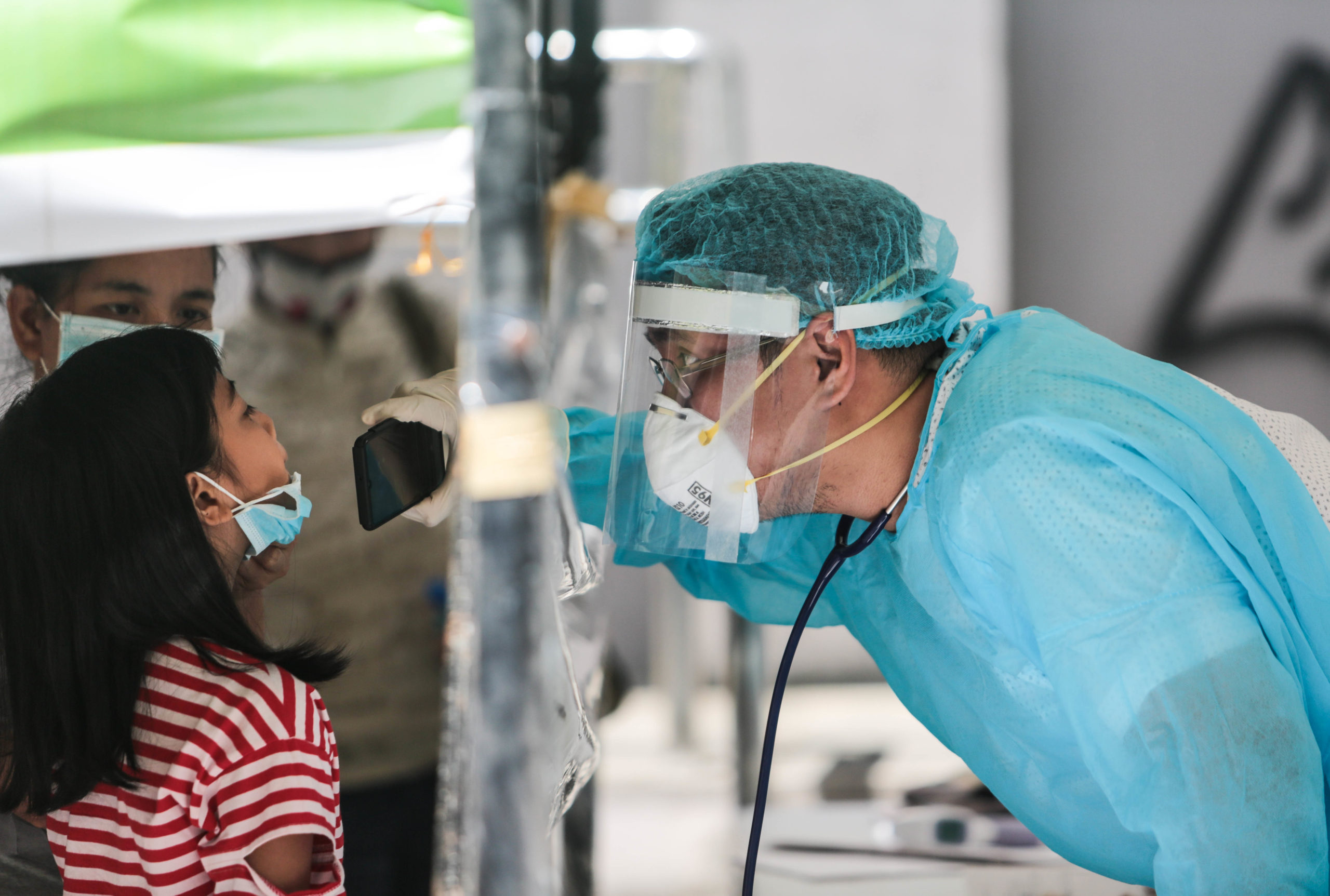‘Balancing act’ in ecozones as firms try to stay afloat

PROTECTION Medical front-liners, like this doctor in Legazpi City, are in dire need of masks and personal protective equipment as they deal with patients amid the spread of the new coronavirus disease (COVID-19). In Bataan province, a company producing medical masks has committed a continuous supply as the country battles COVID-19. —MARK ALVIC ESPLANA
Only 16 of the more than 300 companies inside the Cavite Economic Zone (CEZ) have resumed operations after complying with quarantine guidelines set by the national government to contain the new coronavirus disease (COVID-19).
These firms are operating on a skeleton workforce, barely keeping afloat the export-oriented industry during a global health crisis.
CEZ’s biggest locator, the Japanese HRD Group of Companies which employs about 23,000 to manufacture prefabricated houses and building materials, had shut down.
Luzon quarantine
In 2019, CEZ (comprised of Zones 1 and 2 with a total of 309 companies in the towns of Rosario and Tanza, and General Trias City) alone exported $3,493,148,812.04 worth of products, according to the Philippine Economic Zone Authority (Peza).
Last week, Peza, after consulting with locators and Cavite provincial officials, ordered the closure of the entire ecozone, sending 86,549 workers on forced and unpaid leaves.
Article continues after this advertisementElsewhere in Luzon, 394 companies have also reduced its workforce or implemented a work-from-home (WFH) scheme.
Article continues after this advertisementThere is no data immediately available on the number of Luzon workers affected, but “most [companies outside Cavite] are [still on] partial operations, employing WFH and [skeleton] force,” said Peza director general, Charito Plaza, on Tuesday.
Guidelines
Norma Tañag, Cavite ecozone administrator, said “a company, for example, with 100 workers [is employing] just 12 [people].”
Those that partially reopened as of Tuesday were American Power Conversion (Schneider Electric); Semitec Electronics; Seoknam Inc.; P. Peniel Seoknam; P. Imes Corp., (which supplies syringes to a company in Laguna); Parts Philippines; HS Technologies Inc.; Readore Technology Philippines Corp. (engaged in metal stamping); Macro Wiring Technologies; Newly Ever Rise Electronics; Song Jeong Technology Inc.; Furushima Co. (garments); Heavy Duty Packaging Corp.; JTK Electronics Components Inc.; Ingo Manufacturing (alcohol dispenser); and IMI Philippines (electronics).
Tañag said these companies had disinfected their factories over the weekend and had found accommodation for their workers, some in nearby resorts in Cavite. They are subject to daily inspection by the government.
Peza, in a memorandum on March 22, allowed companies or locators in CEZ to resume operations but “on the condition that they comply with the guidelines set by the government.”
Following the enhanced community quarantine of the entire Luzon, the guidelines included “strict social distancing” in the workplace and temporary accommodation arrangements for employees.
The company must also provide a private shuttle to ferry the workers but only for a short distance between the “approved place of accommodation” and the worksite.
The guidelines apply to business process outsourcing and export-oriented companies, many of which are located in Cavite.
“Peza’s balancing [its] acts,” Plaza said.
“Only [ecozones and companies] complying with the COVID-19 quarantine requirements [are allowed] to operate so as not to cripple the economy or eight million direct and indirect workers will die from hunger,” Plaza added, referring to employees, brokers, forwarders and suppliers in 405 economic zones, or 4,627 companies across the Philippines.
Tañag said it was too early to determine the economic and social impact as companies themselves were “trying to survive, to keep afloat,” during these times.
Medical masks
In Bataan province, despite the closure of other factories inside the Freeport Area of Bataan (FAB) in Mariveles town, the country’s sole manufacturer of medical masks has remained operational.
Taiwanese firm Medtecs Group of Companies has committed to supply the local market with one million medical masks a month to ease the shortage in the country due to the upsurge in cases of COVID-19.
Eliza Calimag, corporate communication department head of the Authority of the Freeport Area of Bataan (Afab), said Medtecs would directly send the medical masks to the Department of Trade and Industry, which would then turn over these to the Department of Health.
The Philippine Red Cross, pharmacies and other local distributors would also get their supplies from Medtecs, Calimag said.
More workers
The company’s plant has increased its workforce, mostly women, from 298 to 318 to meet the local demand for medical masks, according to Hazel Keith Ellorin, the Afab information officer.
Its management had to get more workers from its subsidiaries inside the FAB to sustain their operation, Ellorin said.
“The Afab’s incident monitoring team makes sure that the company observes protocol and safety measures for the safety of its employees to avoid COVID-19 [infection],” she told the Inquirer.
Records from the Afab showed that out of 97 companies in the free port, only Medtecs and Philgreen Manufacturing Corp., which produces alcohol bottles, have remained operational. Others were forced to temporarily stop operations due to the Luzon lockdown.
For more news about the novel coronavirus click here.
What you need to know about Coronavirus.
For more information on COVID-19, call the DOH Hotline: (02) 86517800 local 1149/1150.
The Inquirer Foundation supports our healthcare frontliners and is still accepting cash donations to be deposited at Banco de Oro (BDO) current account #007960018860 or donate through PayMaya using this link.